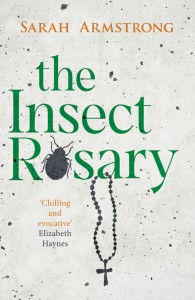 Published by Sandstone Press 18 June 2015
Published by Sandstone Press 18 June 2015
280pp, paperback, £8.99
Reviewed by Shirley Whiteside
The tangled relationships of sisters has long proved a fruitful area for writers to explore. Sarah Armstrong’s tale of two sisters is set in Northern Ireland both in the present day and during The Troubles. The sisters narrate the story, Nancy in the present day, and Bernadette in the flashbacks to 1982. This works well as each point of view, and the differing conclusions each draws, is clearly delineated.
Nancy and Bernadette spend their summers at their mother’s childhood home, a remote farm where their Uncle Donn and Aunt Agatha live. Their English father only arrives for the final week of the holidays and until he does the girls are mostly left to their own devices. They explore the farm buildings even though they have been told not to, with twelve-year-old Nancy daring her ten-year-old sister to open forbidden doors or climb into rickety old barns. Their Aunt Agatha, known to the girls as Sister Agatha as she almost became a nun, tries to instil discipline and respect but her efforts usually elicit a fit of the giggles. As a last resort she gives Nancy and Bernadette a black rosary each which they promptly mislay. There are various comings and goings at the farm, family and other neighbours arrive at odd times and the girls are shooed away to their bedroom. They sneak back to the stairs and try to listen to the adults’ conversations, hearing things that leave them curious and a little frightened. Everyone, it seems, is touched in some way by The Troubles.
In the present day the sisters, long estranged, return to the farm for a holiday with their families. Nancy and her annoying American husband, Elian, and troubled son Hurley; Bernadette with her husband Adrian and bratty daughters Erin and Maeve. Uncle Donn is going to sell the farm and Aunt Agatha is going to a nunnery so it is a last chance for them all to spend time there. For Bernadette it is a chance to go back to her childhood and finally understand why she had a breakdown. Nancy doesn’t want to remember, she only wants to make her mother happy by attempting a reconciliation with Bernadette.
Armstrong skilfully plants clues as to the reason for Bernadette’s breakdown, slowly revealing what happened that last summer at the farm. The flashback scenes are well written as the loyalty of the sisters is tested. Bernadette’s ten-year-old voice is particularly strong as she struggles to understand what the grown-ups are trying to hide. She is brave and her squabbles with Nancy feel authentically child-like. Nancy’s adult voice exposes her guilt and confusion over the events of that summer as she tries to deny Bernadette’s accusations of betrayal. Nancy’s husband is a useful foil to show just how insular and isolated the farm is and his blundering attempts to strike up conversations with the family and locals are wonderfully cringe-making. Although partly set during The Troubles, this is a story of how sisterly disloyalty can ripple through lives causing years of heartache and misery. Betrayal, whether real or imagined, is very hard to put right.
